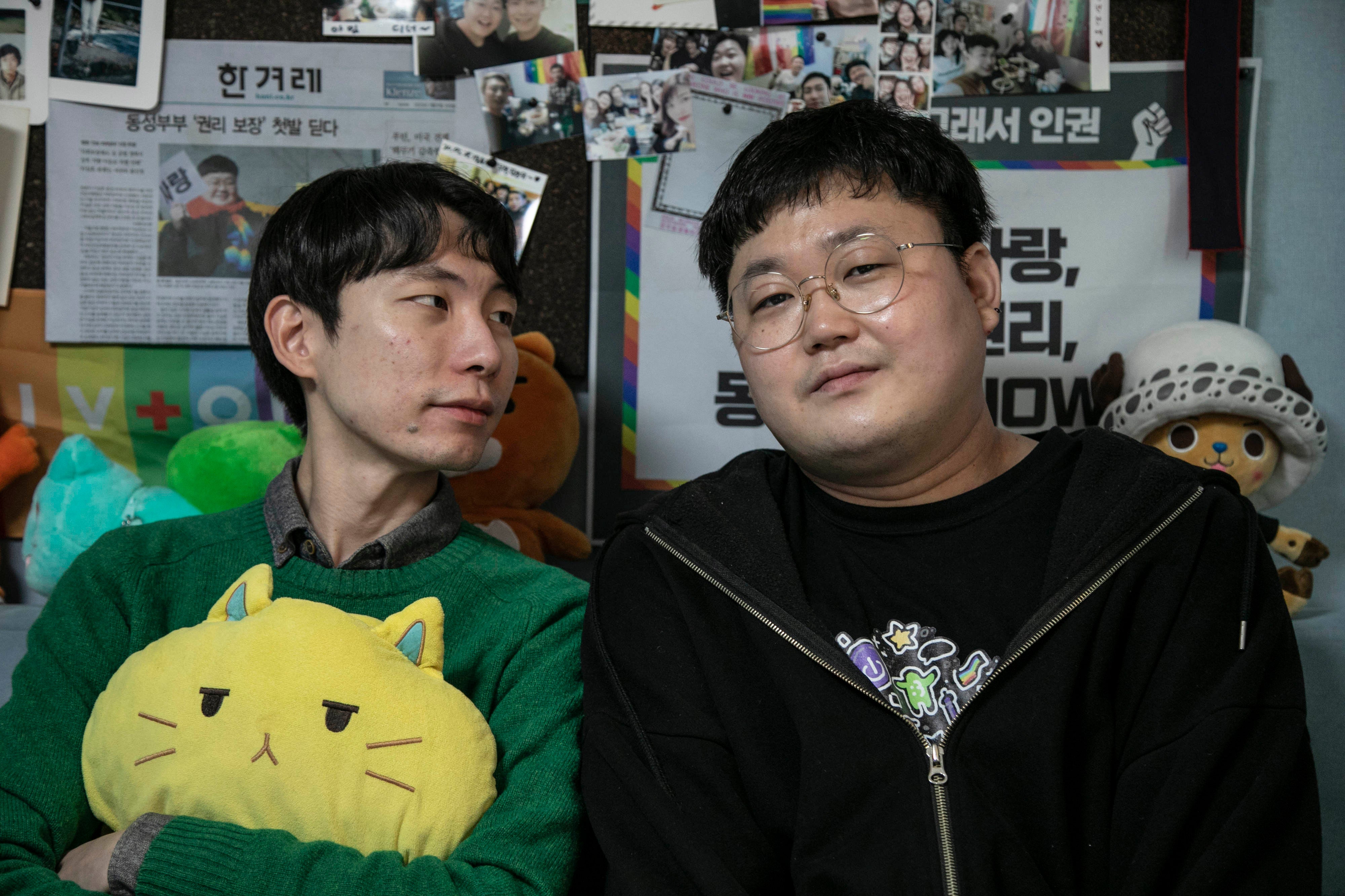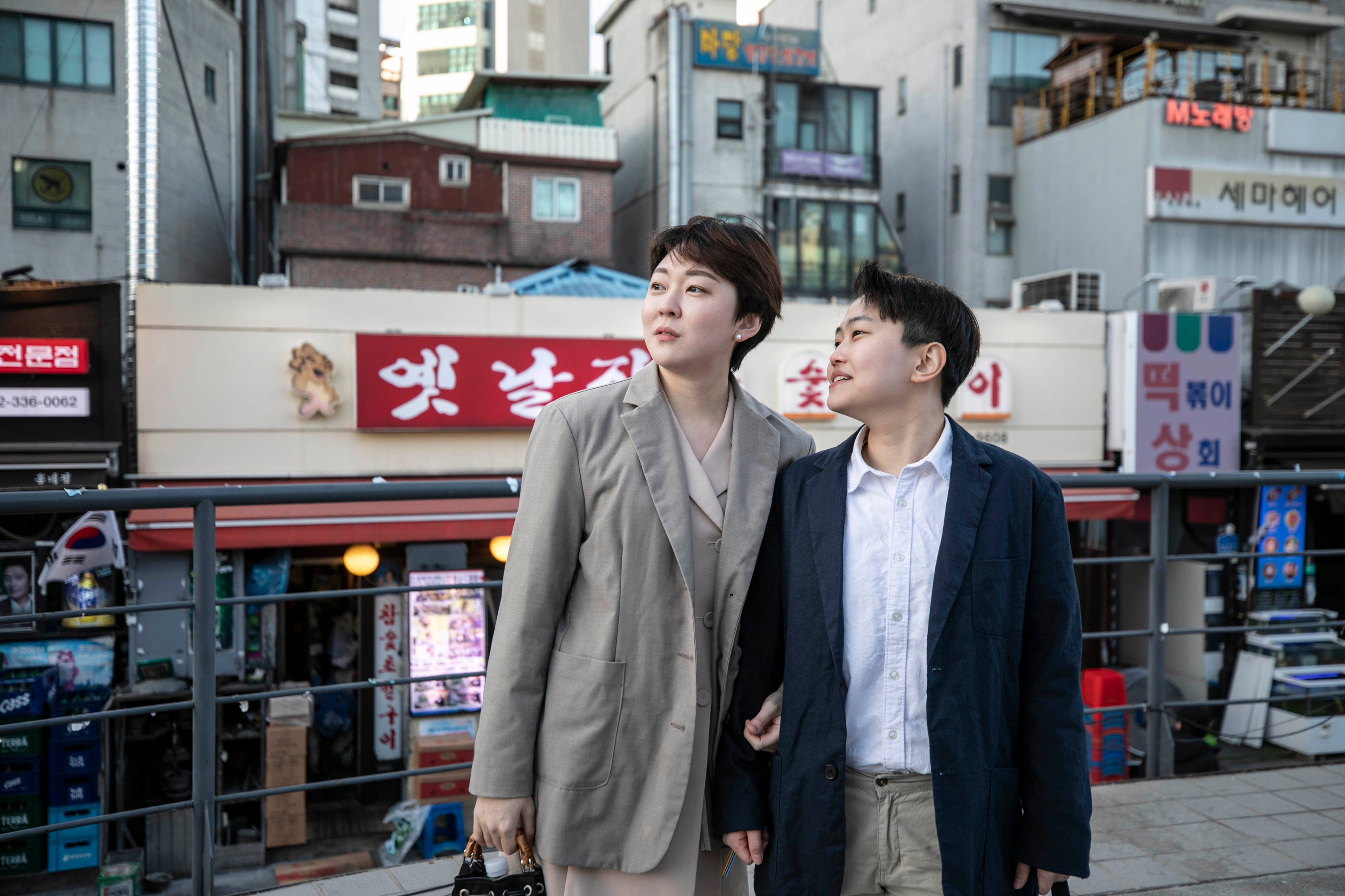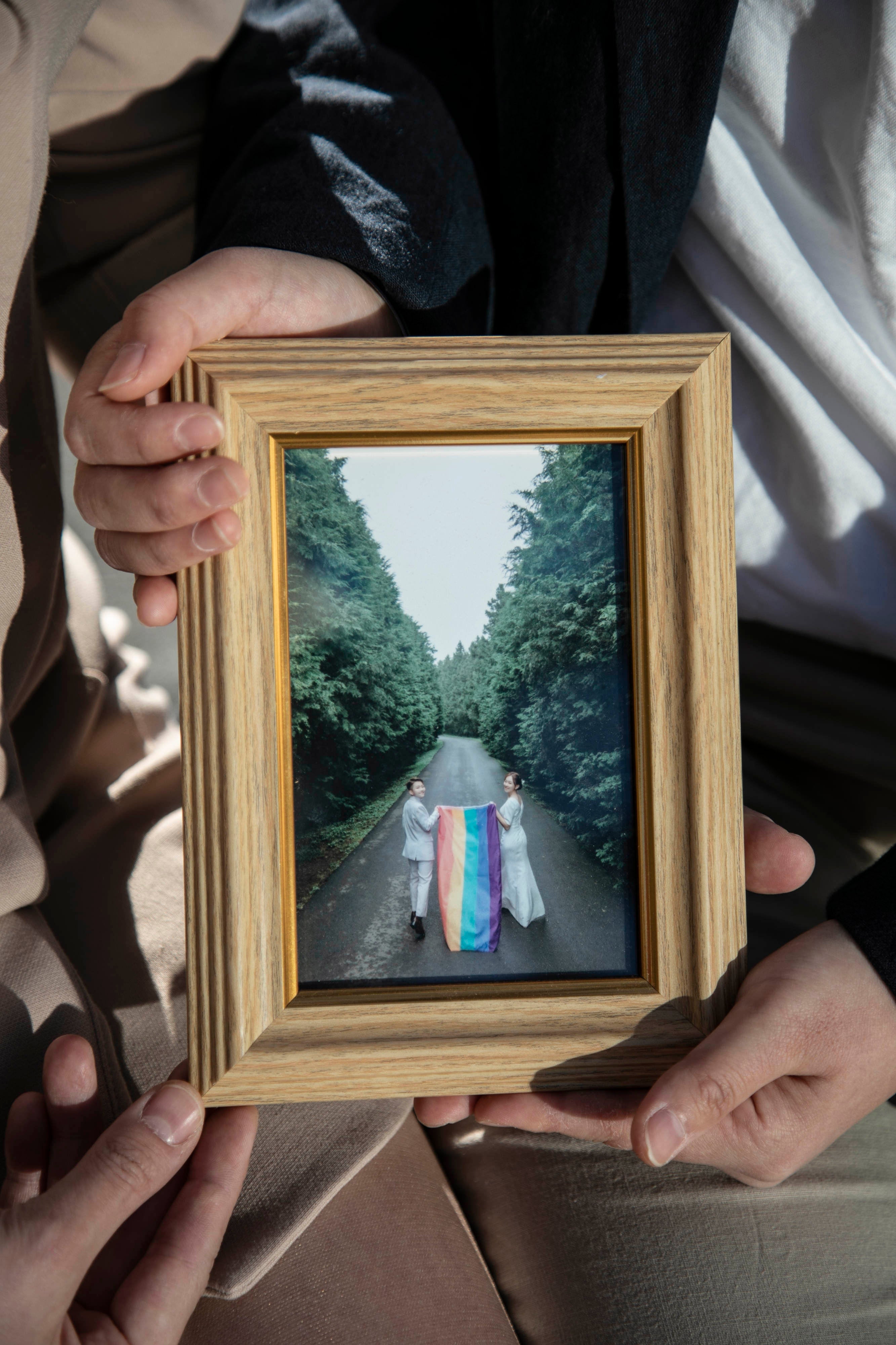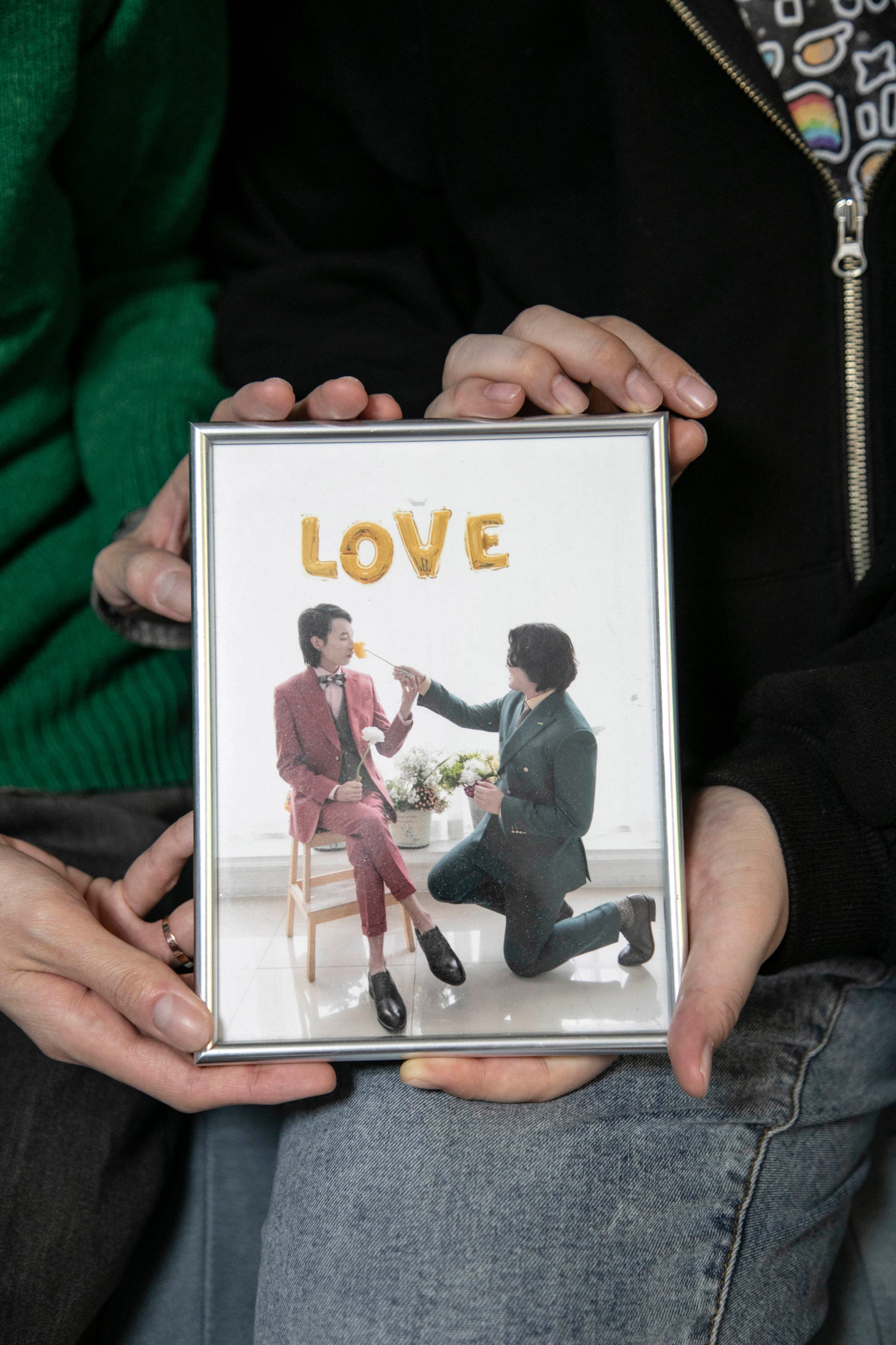South Korea’s gay couples fight for recognition – one law at a time
In this socially conservative society, they are part of a vanguard confronting rampant discrimination against the LGBT+ community, writes Min Joo Kim

So Sung-wook and Kim Yong-min got “married” in pink and green tuxedos as groom and groom. Jin and Jay Park marched down the aisle amid cheers and tears from the guests, in what the women said was “just a big fat Korean wedding” – even if neither same-sex union is legally recognised in South Korea.
In this socially conservative society where homosexuality remains taboo, these couples are part of a vanguard confronting rampant discrimination against the LGBT+ community. They are fighting for the ability to collect prescriptions for sick partners. They are challenging health insurers in court. They are even preparing for death by writing legally binding wills for each other.
“These are things I would not have to even think about if I was heterosexual,” says Jay Park, who is 27 and, until recently, worked at a small start-up. Spousal rights are necessary to take care of one another “until, or even after, death do us part”, she says.
Even after vowing to be together for eternity – and cementing their union with a legal marriage in the American territory of Guam – the two women cannot sign medical consent forms as next of kin or claim inheritances as a married couple.
The uncertainty hit home for them last month when Jay Park lost her job. She does not qualify for spousal coverage under Jin Park’s employer-provided health insurance. (The pair just happen to share the same common Korean surname.)
“I need to stand up to make sure my wife enjoys all the benefits under my name,” says Jin Park, who works at a women’s rights advocacy group. “Love itself can only do so much.”

For a couple navigating the narrow boundaries of South Korean law, a recent judicial decision – brought about by So and Kim – is a source of hope. The Seoul High Court in February ordered the country’s National Health Insurance Service to provide spousal coverage to gay couples after So and Kim, who are both 32, sued the service.
The pair started calling each other “husband” after their wedding ceremony in 2019, and Kim listed his “spouse” as his dependent on his health insurance. The insurer later rescinded the coverage, saying it was an administrative oversight and same-sex partners were not eligible to be listed as dependents.
They sued the insurance provider, and the High Court ruled that it was “discriminatory” to treat same-sex unions differently from common law marriages. The national health insurer last month lodged an appeal with the Supreme Court.
Homophobia remains rampant in South Korea, the world’s 10th-largest economy, due to entrenched gender norms and social conservatism, experts say. It is hardly alone in Asia – neighbours Japan and China do not recognise same-sex relationships either. Taiwan is the only place in the region with marriage equality.
But even in this environment, South Korea’s vociferous evangelical Christian groups make the homophobia particularly loud. Christian groups have vehemently opposed a comprehensive anti-discrimination law to protect marginalised groups from unfair treatment, saying it will threaten traditional family values and propagate homosexuality.
As a voting bloc, they exert an outsize influence on Seoul’s policy toward minorities. The bill has been stalled in parliament for years, largely due to backlash against provisions outlawing discrimination over “sexual orientation”.
These views resonate in the halls of power. South Korean president Yoon Suk-yeol, elected last year on an anti-feminist platform, appointed Kim Seong-hoe, who had previously called homosexuality a “type of mental illness”, to a top advisory role. Kim also said that “homosexuality can be treated” – like a smoking habit. He didn’t remain long in the job, but even when standing down, maintained that he is “personally opposed to homosexuality”.

The Yoon government’s Education Ministry in December revised the national school curriculum to exclude the terms “sexual minorities” and “gender equality” from textbooks, citing a “lack of social consensus” on the subjects. It is for that reason that advocates have been celebrating the recent Seoul court decision, which marked the first time the country’s judiciary has recognised any right for LGBT+ couples.
“Recognition of discrimination in this individual case lays the legal groundwork for many more same-sex couples to win other rights, from similar social benefits to the establishment of marriage equality,” says Park Han-hee, South Korea’s first openly transgender lawyer, who has been acting for the plaintiffs in the lawsuit.
“Its impact goes beyond the courtroom to challenge South Korea’s heteronormative familial institutions, and demonstrate that diverse identities make up South Korean society,” she says.
Plaintiffs Kim and So, who both work at nongovernmental organisations, now say they need other rights addressed so they can remain together “safe and sound to a ripe old age”. Access to health care tops the couple’s concerns, as So has chronic medical conditions.
“Due to a lack of legal recognition of our union, I could not even get a prescription on behalf of my loved one when he was sick in bed,” Kim says.
The couple face a prolonged legal battle as the appeal makes its way through the courts. “It took us two years to claim just one out of a thousand rights unfairly denied to same-sex couples,” So says. “We cannot wait 2,000 years.”
There are other enormous obstacles to overcome in South Korea. The country’s military bans consensual same-sex intercourse between soldiers, making it a crime punishable by up to two years in prison.
In recent years, the South Korean judiciary has limited application of the widely condemned penal code but has stopped short of repealing it. Homophobic abuse and stigmatisation are still rampant across South Korea’s armed forces, in which all able-bodied men must serve a minimum of 18 months under the conscription system.
In fact, So and Kim met during their military service. “Love triumphs” even in the most unlikely environment, Kim says.

While their openly gay life has not been easy, “it is a path we chose to live happily and truthfully”, So says.
The trailblazing pair say they are empowered by support from members and allies of South Korea’s LGBT+ community, including for legal assistance. They, together with their advocates, hope that they can chip away at unfair systems to get greater rights and recognition for their relationships.
“Amid delays in government-led protection of same-sex partnership, efforts by these individuals and small groups have led to a progress in the real world,” says Ryu Ho-jung, one of South Korea’s youngest parliamentarians, at 30.
She and her fellow lawmakers from the liberal opposition Justice Party have vowed, if they win power, to enact a civil partnership law for LGBT+ couples and resolve the parliamentary stalemate over the anti-discrimination bill.
Officially registering her marriage with her same-sex partner has been a goal for Chang Suh-yeon, a lawyer with GongGam Human Rights Foundation in Seoul. While not ruling out that goal, she has been seeking more immediate and realistic solutions to address the issue.
Chang has co-hosted multiple sessions of the “splendid last wishes workshop”. The workshop provides guidance on estate planning for LGBT+ couples, including how to draft a legally binding will to ensure the surviving partner is provided for. “It is with heavy heart same-sex couples prepare their last will as a self-rescue plan in the face of marriage inequality,” she says.
The uncertain future can be demoralising but it also gives Jin and Jay Park a sense of mission to “gather heart and build a happy life”.
Jin Park begrudges the couple’s lack of access to housing benefits granted to newlyweds in South Korea. However, their small apartment lets the couple be “cosy and intimate” together. It is crowded with wedding photos, plants, rainbow ornaments and bikes.
Although their wedding last year was not legally recognised in South Korea, “we Koreans take a ceremony very seriously”, Jin Park says. “It is as official as it gets for us and our families. It shows that we are not going back.”
© The Washington Post
Join our commenting forum
Join thought-provoking conversations, follow other Independent readers and see their replies
Comments
Bookmark popover
Removed from bookmarks